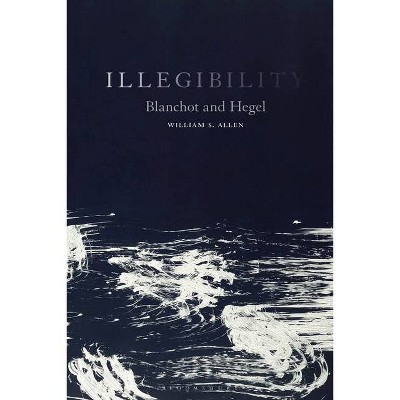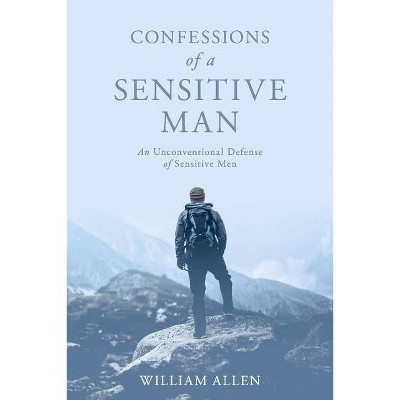Illegibility - by William S Allen (Hardcover)

Similar Products
Products of same category from the store
AllProduct info
<p/><br></br><p><b> Book Synopsis </b></p></br></br>The philosophical significance of Maurice Blanchot's writings has rarely been in doubt. Specifying the nature and implications of his thinking has proved much less easy, particularly in reference to the key figure of G. W. F. Hegel. Examination reveals that Blanchot's thinking is persistently oriented towards a questioning of the terms of Hegel's thought, while nevertheless remaining within its themes, whichshows how rigorously he studied Hegel's works but also how radical his critique of them became. Equally, it allows for a crucial discussion of the differences between Blanchot's responses to Hegel and those of Jacques Derrida, with the implicit suggestion that in some ways Blanchot's critique of Hegel is more far-reaching than that developed by Derrida.<br/> <br/> William S. Allen demonstrates those aspects of Hegelian thought that permeate Blanchot's writings and, in turn, develops a detailed three-way analysis of Derrida, Hegel, and Blanchot. The key question around which this analysis develops is that of the relation between thought and language concerning the issue of the infinite and its legibility. <i>Illegibility</i>introduces a new and substantially philosophical account of Blanchot's importance, and also showshow his writings laid the ground for Derrida's workswhile developing their own uniquely challenging response to the problems of post-Hegelian thought.<b></b><b></b><p/><br></br><p><b> Review Quotes </b></p></br></br><br><i>Illegibility: Blanchot and Hegel</i> applies near-exhaustive knowledge, and laser-like insights, to develop a reading of Hegel through Blanchot, with judicious reference to other thinkers such as Derrida. Hegel stands as a figure for a type of double, even dialectical reflection, in which Blanchot found inspiration even as he challenged and rewrote the Enlightenment philosopher's thinking. Allen's profound and sustained analysis, based on careful attention to texts, represents what the humanities is best able to do, and he proceeds by means of a nonetheless rigorous scientificity that should be the gold standard for researchers in any field.<br/>David Wills, Professor of French Studies and Director of Graduate Studies, Brown University, USA<br><br>How does one approach a written work that problematizes the regulative ideal of a legible book? This question is associated with Derrida's deconstruction of Hegel. As William S. Allen demonstrates in this fascinating study, it was posed in a unique way by Blanchot, whose own engagements with Hegel invite us to rethink the relation between the terms <i>différance</i> and <i>aufheben</i>.<br/>Andrew Cutrofello, Professor of Philosophy, Loyola University Chicago, USA<br><p/><br></br><p><b> About the Author </b></p></br></br><b>William S. Allen</b> (PhD, University of Warwick) is an independent researcher at the University of Southampton, UK, and the author of the following books: <i>Noir and Blanchot: Deteriorations of the Event</i> (Bloomsbury, 2020); <i>Blanchot and the Outside of Literature</i> (Bloomsbury, 2019); <i>Without End: Sade's Critique of Reason</i> (Bloomsbury, 2018); <i>Aesthetics of Negativity: Blanchot, Adorno, and Autonomy</i> (2016); and <i>Ellipsis: Of Poetry and the Experience of Language after Heidegger, Hölderlin, and Blanchot</i> (2007).
Price History
Price Archive shows prices from various stores, lets you see history and find the cheapest. There is no actual sale on the website. For all support, inquiry and suggestion messagescommunication@pricearchive.us




















